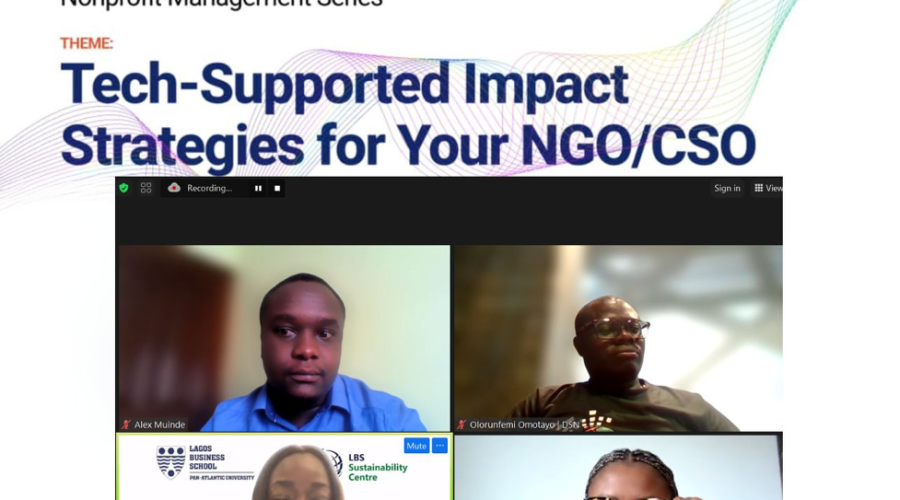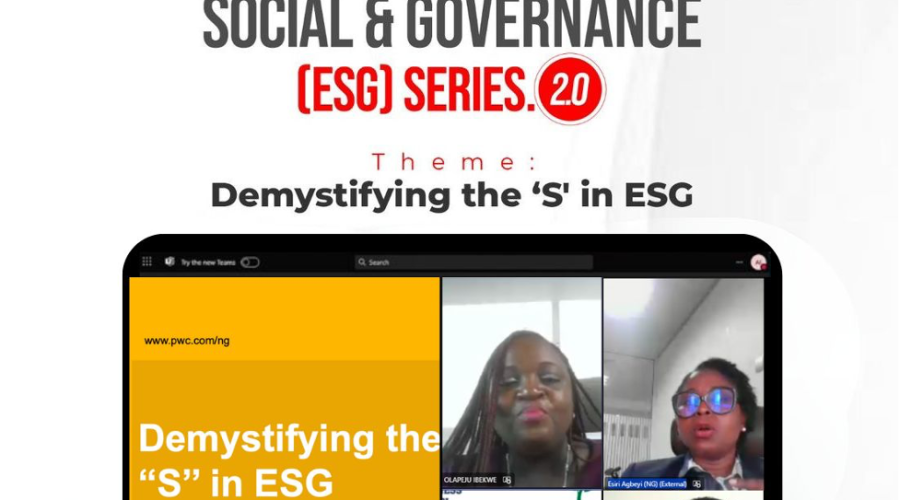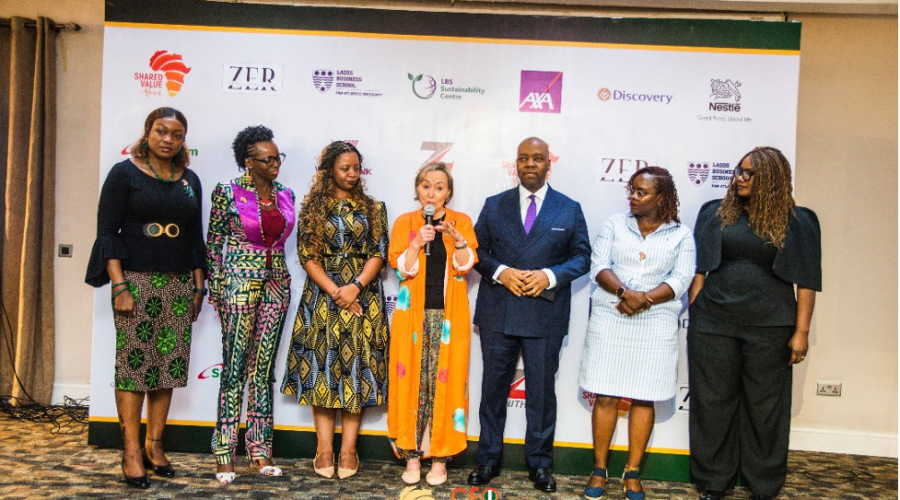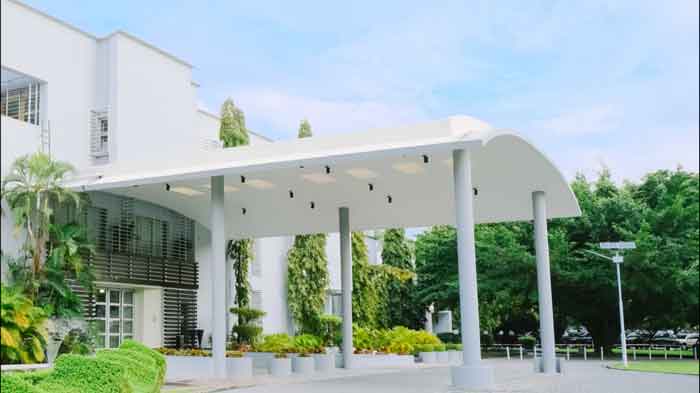The LBS Sustainability Centre is delighted to support our partner Sterling One Foundation working alongside PriceWaterhouseCoopers (PwC), United Nations Industrial Development Office-Investment and Technology Promotion Office (UNIDO-ITPO) Nigeria, NGX Group, Nigeria Employers Consultative Association (NECA), and the Lagos Chamber of Commerce & Industry (LCCI) to deliver the inaugural edition of the Environmental, Social & Governance (ESG) Series.
The first edition of this insightful webinar was themed ‘Understanding ESG and Its Business Case’ and was held on Tuesday, April 30, 2024. This session provided professionals with invaluable insights into the business implications of ESG priorities and management principles, aligning them with global sustainability standards demanded by investors and regulators. Participants engaged in insightful discussions led by esteemed ESG thought leaders and speakers such as Olapeju Ibekwe, Chief Executive Officer, Sterling One Foundation; Abimbola Olufore Wycliffe, Head, UNIDO-ITPO Nigeria; Marilyn Obaisa-Osula, Head, ESG, Sustainability and Climate Change, PwC; Eunice Sampson, Partner, Climate Change & Sustainability Services, EY West Africa; and Dr. Irene Robinson-Ayanwale, Divisional Head, Business Support Services, NGX Group.
Olapeju Ibekwe, CEO, Sterling One Foundation, gave the opening remarks with an expose on ESG, tracing its evolution back to the 20th Century when in the 1960s, ESG-like actions started to gain grounds with boycotts and activist movements. She remarked, “ESG determines investment decisions, shapes business strategies, and influences the global economy by giving companies a strategy to go beyond just environmental sustainability to be more impactful on the world and report this impact better. ESG is happening fast, and being aware of trends is key to ongoing ownership.”
Abimbola Olufore Wycliffe, Head, UNIDO-ITPO Nigeria, spoke on why ESG Matters, she said, “ESG factors are increasingly being recognised as critical indicators of a company’s long term financial performance and risk management. Beyond financial returns, ESG also addresses broader environmental and societal concerns, contributing to a more sustainable and equitable world.” In her case presentation, Marilyn Obaisa-Osula, Head, ESG, Sustainability and Climate Change, PwC, established a nexus between ESG and the SDGs, showing how they both contribute to a more sustainable and responsible future. She cited key drivers of sustainability in Africa such as regulatory compliance, social licence, brand value and sustainability ratings, growing E and S litigation, and sustainable finance. Other countries are maximising these more than us, and it just takes us to employ responsible business practices to make a sustainable future our reality.
She indicated that, “ESG promotes capacity building, redefines business resilience and continuity, gives a competitive edge, delivers strategic impact and value creation, redefines going concerns, enables responsible resource management and inspires innovation for a more sustainable future. There are opportunities that ESG has thrown up that professionals and organisations can harness such as the blue, green and circular economy concepts. Over and above, ESG drives cross-functional and multi-sectoral collaboration for business growth, economic development and social impact that unlocks value in our society. ”
Dr. Irene Robinson-Ayanwale, Divisional Head, Business Support Services, NGX Group indicated that, “The move towards a more resilient and sustainable future has brought ESG considerations under the spotlight and is proving central to investment, divestment, consumer and operational decisions.” She added, “Sustainability reporting globally has evolved from what is considered a business non-essential to a responsible business practice today. Among the key trends shaping the corporate sustainability landscape today are the consolidation among standard-setters; regulation focused on ESG-related disclosures; and maturation of ESG data and disclosures within both public and private markets.”
LBS Sustainability Centre’s Affiliate/Fellow – Eunice Sampson, Partner, Climate Change & Sustainability Services, EY West Africa, gave some key takeaways to the participants to go back to their organisations to entrench sustainability in their organisations. She reiterated, “ESG helps future-proof businesses, collective ESG integration helps build a more sustainable and equitable world. Sustainability is very broad and includes everything that can make or break a business, carrying out a materiality assessment helps you determine which universe of issues is relevant to your company so you do not use an all-size-fits-all approach. Overall, measuring performance is important as a way of tracking progress.”
To catch up with the learnings, watch the video playback of the web forum here.
Sterling One Foundation is a vehicle for positive social impact across critical sectors in the Nigerian economy. Driven by the unique challenges facing millions of Africans, they are keen on contributing to the Sustainable Development Goals (SDGs), harnessing demographic dividends and improving the lives and livelihoods of people in under-served communities. Through their innovative programmes and integrated approach, they engage in stakeholder-driven interventions that are geared towards socio-economic development, wealth creation, employability, sustainability and national development. Although established by Sterling Bank, Sterling One Foundation has a separate board of trustees and prioritises social impact investments across critical sectors for maximum impact.
Lagos Business School is Africa’s leading management education institution and the LBS Sustainability Centre is a leading knowledge centre that brings together the theory and practice on business and sustainability for the advancement of performance and development outcomes. For more information about the initiatives and upcoming events by the Lagos Business School Sustainability Centre, please contact sustainabilitycentre@lbs.edu.ng. Visit our website to sign up for the next run of the programme to elevate your knowledge and competency on ESG Materiality Assessment and Sustainability Reporting. https://lbssustainabilitycentre.edu.ng/training.






